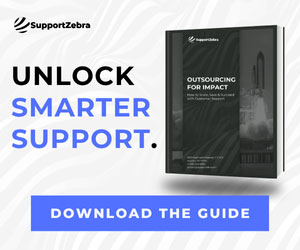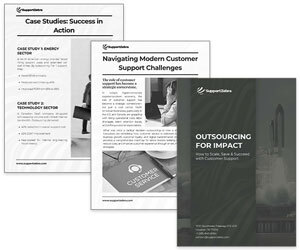You can spend a fortune on outsourcing your call centre functions – even more if you get it wrong and have to start all over again. Call Centre Helper talks to nine experts from the outsourcing and consultancy world.
small.jpg)
Look for an outsourcer that isn’t afraid to say no
Recommendation from Stuart Gray, managing director at outsourcer 2Touch (www.2touch.co.uk)
In order for outsourcing to work effectively, the outsourcer has to embrace the client’s brand values and feel as if it’s an extension to the client’s business, rather than just another supplier. It’s vital that the outsourcer takes valuable time to understand the client’s objectives. It is also important that any commercial or legal issues that may affect the relationship, if the outsourcer were to do something that wasn’t right, are highlighted at the start of the relationship. This ensures that the outsourcer maintains a high level of professionalism and, more importantly, is able to provide a first class service for the client’s customers.
Also look for an outsourcer that is not afraid to say no to potential clients if it doesn’t possess the necessary capabilities to deal with their requirements. More often than not, an outsourcer can set itself up for a fall because it hasn’t committed to ensuring it understands clients’ objectives and finds later down the line that it doesn’t have all of the capabilities in-house to ensure that a high level of customer service is delivered.

Spend time with them; find out how they really work Recommendation from Caroline Worboys, chief executive officer at outsourcer Broadsystem
The main considerations for clients when deciding whether to outsource or not depends primarily, for the majority of organisations, on cost and control. The most obvious question to ask is: “Do we have the facilities / trained staff in-house? And even if we do, can they cope?” Many clients have no idea about the considerations of an in-house customer contact operation, how many staff to employ and so on.
To get the best out of an outsourced supplier, it is also essential to have a good enough relationship to treat them as a partner, rather than simply as an outsourced supplier. After all, they are representing your company.
Naturally, when looking to outsource, there will be a bewildering number of suppliers to consider, some of which will sadly be fly-by-night, cowboy operations who – if employed – could actually succeed in being more brand damaging than brand enhancing. It is therefore essential to do as much research as possible on potential outsourcers – for example, investigating previous and current clients and expertise. If they provide a similar, successful service for another company, the likelihood is you won’t get your fingers burnt.
Find out how established the operation is and investigate the value they can add to your business. Spend at least a day with them, absorbing how calls are dealt with. Talk to the agents, and not just the ones recommended by the senior people at the call centre. I cannot emphasise enough the need for in-depth research. This is what could ultimately make or break your customer relationships.
s.jpg)
Seven steps to finding the right outsourcer Recommendation from Penny Bousfield, director of outsourcing at customer management consultancy, CM Insight
Contact centre outsourcing is an increasingly popular option, but 30% of all engagements fail. Personally, I blame the way we choose our partners. With that in mind, here are my seven steps to getting the vendor decision right”
- Set the scope. Outline the work to be done and, if there are problems with your processes, fix them now. Outsourcing a headache will only increase the pain.
- Create a long list. Ideally include some companies you know and a handful you don’t. At this stage ask yourself only if they’re capable of the task and whether they’re the sort of company you’ll enjoy working with. Detail comes later.
- Make informal queries to gauge interest. Some will fall out at this stage because they have a conflict of interest or can’t meet your timescales. Beware the company that says it can build resource for your project, although they don’t have it today. Do you really need to gamble?
- Request information – assess the vendor’s service and product areas, systems capabilities, telecoms set-up, location and client expertise. Beware over-sell.
- Research your shortlist. Visit the sites of six to eight strong contenders and introduce as many of their people to as many of yours as you can. The outsourcing decision might be yours, but it’s your team they’ll have to work with.
- Invite to tender. Meet with the operational and account management teams who would manage your business and test the resilience of their skills. Discuss what you need to achieve and how success will be measured.
- Evaluate options. Examine and score proposals in the following areas: physical capabilities; relevant experience; hunger for the business; the robustness of their pricing and contracting structures; and, lastly, human factors. Do they have a culture and way of working that suits your own?
When a clear winner emerges through this rigorous process, you’ll have the confidence of knowing they understand and share your business objectives, challenges and ambitions for the future.

Bring in the experts Recommendation from Dan Cuthbert, managing director at Cuthbert Contact Centre Consulting
So many call centre outsourcers, so many options; who do you choose to trust with your brand and how do you ensure the arrangement will work?
There are of course no guarantees, but the key is knowing exactly what it is that you want out of the partnership and having clear, smart objectives for evaluating how it is performing.
Put in place an experienced person to project manage the whole process from the day you decide to outsource. The most successful partnerships between companies and their call centre outsourcers tend to occur when the client has appointed an expert. Too often, the process and the subsequent shortlist are managed by a member of the procurement department. An appointed outsourcing manager, meanwhile, will put together a project team that will include members from your information technology, human resources, marketing and operations departments and will prepare a bespoke process that ensures you are evaluating outsourcers that can deliver in every aspect.

Don’t outsource your customers when offshoring Recommendation from Joe Venkataraman, director of BPO provider Mastek (UK) Limited
Business process outsourcing (BPO) has had to become a fundamental part of business life for most large corporates. But wholesale BPO for the front and back office, without consideration for the quality of the relationship with the customer, has been shown to be a ‘high risk’ strategy from which many, including some high profile, high-street names, are now retreating.
This is because such strategies fail to utilise the right staff, with the right skills, for the right jobs – and undermine business value as a result. Offshore staff offer fantastic skills but cultural and dialect differences undermine their value in key customer-facing roles such as call centres. The differences are often too great to overcome and lead to significant customer dissatisfaction.
If organisations want to reduce the risk associated with outsourcing and retain control over a core business area, namely customer service, they should eschew the offshore customer call centre and instead focus on non-customer facing areas where real business value can be captured.
It has been proven that the real business value can be obtained by outsourcing software development work back to India. In addition, it is fast emerging that offshoring back office functions will have a similar effect and is fast gaining momentum. By exploiting the skills of the offshore provider in this way, organisations can attain the required cost benefits while achieving continual service improvement by learning from each customer interaction.

Don’t trust the numbers. Go see for yourselfRecommendation from Simon Pell, chairman of outsourcer Pell & Bales.
Assuming you’ve made the commitment to outsource, the biggest issue for both sides is to manage operational risk. While it’s the outsourcer’s responsibility to manage his staff, churn can often eat away any labour arbitrage benefits of outsourcing.
So don’t just rely on the vendor to tell you the figures. Don’t even rely on mystery shopping responses. Go see for yourself. Make regular visits to get a feel for the operation and the levels of motivation.
Whether staff leave for what they perceive to be a better job, more money or because they are simply fed up, they will leave at some point. The challenge is in keeping the good employees loyal and wanting to progress in your company. Within this industry, where job roles and salaries are often comparable, building motivation and showing individuals they are valued team members goes a long way to developing loyalty.
At Pell & Bales we are lucky to have inspiring clients to work for, but even then, motivation can slip. Visits from clients are a great way to remind people at the coalface what it’s all about.

Determine the ‘voice’ and ‘spirit’ of your call centre in advance Recommendation from Paul Miller, contact centre director at outsourcer Prolog Connect Launching a new outsourcing relationship usually involves a huge amount of time spent on the contractual terms and conditions. In turn, this can focus attention disproportionately on the risk factors associated with the outsourcing relationship. Similarly, a proliferation of product specifications and scripts can over-emphasise compliance as a performance measure. These two areas often inhibit the outsourcer and short-change the client.
I believe that a key part of any outsourcing arrangement should be a definition of the ‘spirit’ of the agreement and the desired ‘voice’ of the contact centre.
While these can be difficult to express and very hard to implement, in the long-term they provide the basis for a flexible, long-lasting outsourcing partnership that produces great communications. Without them, you can easily end up with communication that is factually and numerically correct but doesn’t get the job done.
s.jpg)
Ensure your managers and infrastructure are in order Recommendation from Mike Relf, managing director of the outsourcer ROCKETUK.COM
The call centre must be the right fit for the campaign(s) and demonstrate an eagerness and ability to learn about the business, its processes, products, services, customer needs and expectations.
The management team needs to act as a bridge between the client and the agent, understanding campaign objectives and giving clear direction to a well-staffed, adaptable team of agents, instilling confidence that the brand will be well-represented.
This must be complemented by an infrastructure that makes it possible for agents to complete the maximum amount of calls without any loss in quality. These systems ensure information given out is consistent and accurate and that data captured is done so efficiently and swiftly. In addition, it assists the management team in delivering reports to the client, vital to providing accountability over targets and control over the campaign as it progresses.

Train your outsourcer to allow them to offer the best level of serviceRecommendation from Mike Purvis, managing director at the outsourcer Transcom UK Training is too often viewed as a ‘nice to have’ addition, or its effectiveness is just assumed by outsourcing clients. In reality, it’s a major contributor to effective service. Outsourcers that can consistently maintain their service standards will grow the fastest and retain their clients the longest.
Training might be a massive investment, but it’s one that is critical to success. It ensures constant employee learning and development – training the company and the role, skills for the job, information technology and system tolls and procedures, specific product knowledge, clients’ tools, services and offerings, and group working and leadership skills.
What you, as the client, need to do is to give your outsourcer the tools and procedures to ensure your outsourcer’s agents either know the answers or have them at their fingertips. This means ‘better than just adequate’ training and effective information gathering and management. Excellent people have to be supported by great processes, after all.
The following comments have been posted relating to this article:
As being a call centre owner in India I want a good outsourcing campaign work in India to outsource from here. Any ideas about how to go about it?
Author: Jonty Pearce
Published On: 27th Jan 2007 - Last modified: 29th Apr 2024
Read more about - Customer Service Strategy, Business Process Outsourcing (BPO), Dan Cuthbert, Offshoring

















